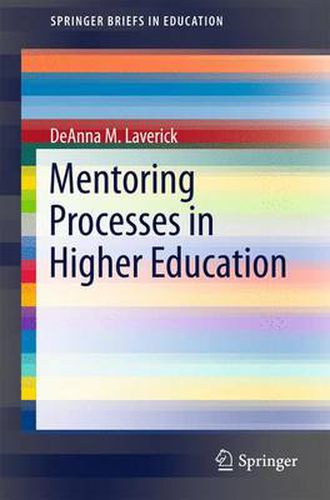Readings Newsletter
Become a Readings Member to make your shopping experience even easier.
Sign in or sign up for free!
You’re not far away from qualifying for FREE standard shipping within Australia
You’ve qualified for FREE standard shipping within Australia
The cart is loading…






This title is printed to order. This book may have been self-published. If so, we cannot guarantee the quality of the content. In the main most books will have gone through the editing process however some may not. We therefore suggest that you be aware of this before ordering this book. If in doubt check either the author or publisher’s details as we are unable to accept any returns unless they are faulty. Please contact us if you have any questions.
This book portrays the various ways in which mentoring occurs in higher education. Targeting the stakeholders who benefit from mentoring, namely faculty, graduate and undergraduate students, and their professional colleagues, this book supports those who are involved in the mentoring process. It synthesizes the professional literature on mentoring and shares examples of effective practices that address the needs of mentors and their proteges. The book describes mutual benefits of mentoring, along with the characteristics of effective mentors and the ways in which they may support their proteges. The relationships discussed in Mentoring Processes in Higher Education surround mentoring new faculty; peer mentoring for professional development; mentoring through research, scholarship, and teaching opportunities; and mentoring through field experiences, athletics, and student organizations. The book shares the voices of mentors and their proteges as it illustrates how mentoring relationships form the basis for reflection, a transaction of ideas, and growth in knowledge and skills to ultimately advance the institution and field through a collaborative environment in which stakeholders thrive and are valued for their contributions. The cyclical effect of positive mentoring is illuminated through real-life examples that show how proteges eventually become mentors in a continual process of support.
$9.00 standard shipping within Australia
FREE standard shipping within Australia for orders over $100.00
Express & International shipping calculated at checkout
This title is printed to order. This book may have been self-published. If so, we cannot guarantee the quality of the content. In the main most books will have gone through the editing process however some may not. We therefore suggest that you be aware of this before ordering this book. If in doubt check either the author or publisher’s details as we are unable to accept any returns unless they are faulty. Please contact us if you have any questions.
This book portrays the various ways in which mentoring occurs in higher education. Targeting the stakeholders who benefit from mentoring, namely faculty, graduate and undergraduate students, and their professional colleagues, this book supports those who are involved in the mentoring process. It synthesizes the professional literature on mentoring and shares examples of effective practices that address the needs of mentors and their proteges. The book describes mutual benefits of mentoring, along with the characteristics of effective mentors and the ways in which they may support their proteges. The relationships discussed in Mentoring Processes in Higher Education surround mentoring new faculty; peer mentoring for professional development; mentoring through research, scholarship, and teaching opportunities; and mentoring through field experiences, athletics, and student organizations. The book shares the voices of mentors and their proteges as it illustrates how mentoring relationships form the basis for reflection, a transaction of ideas, and growth in knowledge and skills to ultimately advance the institution and field through a collaborative environment in which stakeholders thrive and are valued for their contributions. The cyclical effect of positive mentoring is illuminated through real-life examples that show how proteges eventually become mentors in a continual process of support.